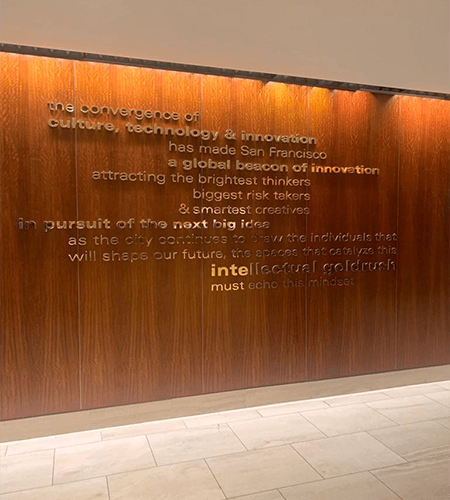Following an immersive week with the Enterprise Hub’s deep tech programme in San Francisco Bay and Northern California, Senior Ecosystem Manager, Katie Saddleton, reflects on the elements that have driven the area’s success.
The mission was part of the Hub’s exclusive, deep tech programme EXPLORE, which helps entrepreneurs to navigate the challenges of being a deep tech founder, while increasing their visibility, connections, and exposure to investment in new ecosystems.
EXPLORE is the pinnacle of the Enterprise Hub’s support for tech entrepreneurs, designed around a micro-cohort of five innovators who have completed one of the Hub’s startup or scaleup programmes.
From making on-the-ground connections with investors, to exploring export and investment opportunities, the San Francisco mission was a week brimming with learning, inspiration and potential. The five founders gained insights into the workings of the ecosystem from world-leading technology companies and academic institutes and local experts.
What makes Silicon Valley such a thriving ecosystem for innovation?
Silicon Valley is widely recognised as one of the world's leading hubs for technological innovation. It has produced innumerable game-changing companies, such as Apple, Google, and Meta, and continues to attract top talent and investment from around the world. There are five defining characteristics behind its success:


1. Culture of innovation
Silicon Valley has a palpable culture of innovation. There is clear focus on experimentation, rapid iteration, and continuous improvement which creates a culture that embraces failure as learning opportunity. It is also a culture that constantly pushes the boundaries of what is possible, is willing to take risks and disrupt established industries (think Google X and its Moonshot programme). This is not merely an undertone, but is in full view for its inhabitants with visible examples of innovation everywhere.
2. Entrepreneurial spirit
Among the swathes of talented and ambitious individuals in the ecosystem there is a clear willingness to take risks and pursue new ideas. However, from attorneys with multiple ventures, right through to individuals who we met in coffee shops referencing the new fintech platform they’re building, this mindset is not only consigned to entrepreneurs. Most individuals are also only a few degrees removed from game-changing innovators or the buildings where these industry-disruptors started. making this spirit of possibility infectious and a significant draw for like-minded individuals across the world.
3. Significant resource
It would be remiss not to acknowledge that the substantial resource available is a key driver for the success of the ecosystem. Capital is plentiful. For example, according to Crunchbase, the median Series A in Europe was $8.5 million in 2021, compared with $13 million in the US. But the resource availability is not limited to capital alone. The ecosystem has access to leading incubators, accelerators, academic institutes, venture capital firms, and expert services, all of which are fundamental.
4. Concentrated talent and expertise
There is a clear abundance of talent and expertise in the ecosystem, particularly around key areas, such as engineering and design. Leading academic institutions, such as Stanford, Carnegie Mellon and UC Berkeley, are a stone’s throw away. This enables a strong pipeline of talent for startups to recruit the skilled workers required to grow and succeed. Expertise provides talent to startups, but it also feeds other key groups in the ecosystem such as investors. Investors with technical backgrounds were in the majority, offering considerable advantage to deep tech companies seeking investment.

5. Collaboration first
Lastly, one thing that stands out considerably is the longstanding tradition of collaboration and knowledge sharing. Innovators at all levels seem willing to share their experience, insight and resource with others in the ecosystem, fostering this community of innovation and growth. On an individual-to-individual basis, right up to larger corporations’ headquarters being situated side-by-side – there is a true sense that collaboration to tackle shared problems comes first, and competition comes into play later at market level. This collaboration is also evident across industry-academic engagement, which is both bidirectional and multifaceted.
In short, Silicon Valley's status as the home of world-leading companies and talent has been reinforced and strengthened over many years. Fuelled by a culture of innovation and an infectious entrepreneurial spirit, it is abuzz with inspiration and potential.
Arguably, there are not ‘more great ideas’ in Silicon Valley than other tech ecosystems, but simply better access to talent, expertise, capital and a greater appetite for risk, which transforms more ideas into startups. This, in turn, means more startups in Northern California are able to thrive, disrupt industries and compete on a global scale.
As the UK strives to strengthen innovation and fulfil its technology ambitions, there are valuable lessons to be learned from how the building blocks of Silicon Valley’s ecosystem nurtured the growth of a disruptive and hugely successful environment.
If you would like to join the next EXPLORE overseas mission, or find out more about our global connections, contact Senior Ecosystem Manager, Katie Saddleton at [email protected].
Related content
Explore
Empowering leaders to unlock connections, insights and support for strategic exploration of global markets. Applicatio…
How to apply
Empowering leaders to unlock connections, insights and support for strategic exploration of global markets. Apply now…
